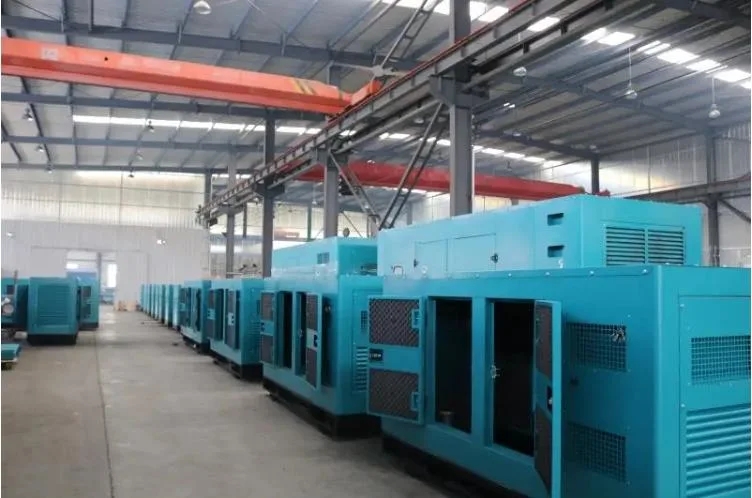Introduction
Diesel generators are crucial for providing backup power in various industries and settings where a reliable power supply is essential. These generators play a vital role in ensuring uninterrupted operations during power outages or in off-grid locations. However, to maximize their effectiveness, it is essential to maintain high reliability standards in diesel generators. This article will explore the importance of reliability in diesel generators, the factors that influence reliability, and best practices to ensure optimal performance and longevity.
Importance of Reliability in Diesel Generators
Reliability is a critical factor in the operation of diesel generators, as any downtime can result in significant disruptions and financial losses for businesses. In industries such as healthcare, data centers, telecommunications, and manufacturing, where continuous power supply is essential, reliable diesel generators are indispensable. These generators serve as a backup power source during grid failures or emergencies, ensuring that critical operations remain uninterrupted.
Moreover, diesel generators are often used in remote locations or areas with unreliable grid power, making reliability even more critical. In such scenarios, diesel generators are the primary source of power, and any failure can lead to severe consequences. Therefore, ensuring high reliability standards in diesel generators is paramount to maintain operational efficiency, productivity, and safety.
Factors Influencing Reliability in Diesel Generators
Several factors can influence the reliability of diesel generators. Understanding and addressing these factors are essential to maintain optimal performance and prevent unexpected failures. Some of the key factors that impact reliability in diesel generators include:
1. Maintenance Practices: Regular maintenance is crucial for ensuring the reliability of diesel generators. Proper maintenance, including routine inspections, servicing, and testing, helps identify and address potential issues before they escalate into major problems. Neglecting maintenance can lead to decreased performance, increased fuel consumption, and higher risk of breakdowns.
2. Environmental Conditions: The operating environment plays a significant role in the reliability of diesel generators. Extreme temperatures, humidity, dust, and other environmental factors can impact the performance and longevity of the generator. Adequate ventilation, temperature control, and protection from harsh conditions are essential to ensure reliable operation.
3. Fuel Quality: The quality of fuel used in diesel generators directly affects their reliability. Contaminated or poor-quality fuel can clog filters, injectors, and other components, leading to reduced efficiency and potential damage to the generator. Regular fuel testing and filtration are essential to maintain the reliability of diesel generators.
4. Load Management: Proper load management is crucial for ensuring the reliability of diesel generators. Overloading the generator or sudden changes in load can put undue stress on the engine and other components, leading to premature wear and potential failures. Monitoring and managing the load effectively can help optimize performance and prevent reliability issues.
5. Age and Usage: The age of the diesel generator and its usage pattern can also impact reliability. Older generators may experience more frequent breakdowns and require more extensive maintenance. Additionally, generators that are used frequently or operate under heavy loads may have a shorter lifespan and higher risk of failures.
Best Practices for Ensuring Reliability in Diesel Generators
To maintain high reliability standards in diesel generators, it is essential to follow best practices that help optimize performance, prevent breakdowns, and extend the lifespan of the equipment. Some of the best practices for ensuring reliability in diesel generators include:
1. Regular Maintenance: Implementing a comprehensive maintenance schedule is crucial for ensuring the reliability of diesel generators. This includes routine inspections, oil and filter changes, fuel system checks, cooling system maintenance, and testing of critical components such as batteries and alternators. Adhering to the manufacturer's maintenance guidelines and scheduling preventive maintenance tasks can help identify and address issues early on.
2. Monitoring and Testing: Continuous monitoring of key parameters such as oil pressure, coolant temperature, fuel level, and battery voltage is essential for detecting any abnormalities or potential failures. Investing in monitoring systems and conducting regular testing of the generator's performance can help identify issues before they escalate and ensure reliable operation.
3. Fuel Quality Management: Ensuring the quality of fuel used in diesel generators is critical for maintaining reliability. Regular fuel testing, filtration, and storage practices can help prevent fuel contamination and degradation, which can impact the performance of the generator. Using clean and high-quality fuel that meets the manufacturer's specifications is essential for optimal operation.
4. Environmental Considerations: Providing a suitable environment for the diesel generator is essential for ensuring reliability. Proper ventilation, temperature control, and protection from moisture, dust, and other contaminants can help extend the lifespan of the equipment and prevent performance issues. Regular cleaning and inspection of the generator's surroundings can also help maintain reliability.
5. Load Management: Effective load management is crucial for optimizing the performance and reliability of diesel generators. Avoiding overloading the generator, managing sudden load changes, and balancing the load across multiple generators can help prevent stress on the engine and other components. Monitoring the load profile and adjusting the operation accordingly can help maximize efficiency and reliability.

6. https://www.lkpowerplant.com/400kw/ and Documentation: Providing adequate training to operators and maintenance personnel is essential for ensuring the reliability of diesel generators. Proper training on generator operation, maintenance procedures, safety protocols, and troubleshooting techniques can help prevent errors and ensure that the equipment is operated correctly. Maintaining detailed documentation of maintenance activities, test results, and performance data can also help track the generator's reliability over time.
Conclusion
Maintaining high reliability standards in diesel generators is essential for ensuring uninterrupted power supply in critical applications and locations. By understanding the factors that influence reliability and following best practices for maintenance, monitoring, fuel management, load balancing, and training, businesses can optimize the performance and longevity of their diesel generators. Investing in reliability measures not only helps prevent downtime and operational disruptions but also enhances safety, efficiency, and overall productivity. By prioritizing reliability in diesel generators, businesses can ensure a dependable backup power source that meets their operational needs and regulatory requirements.
